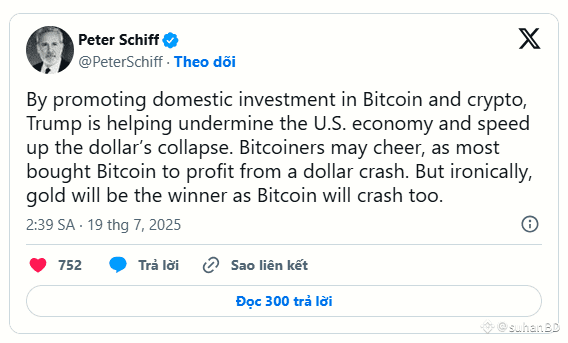Gold bug Peter Schiff is showing anger towards Bitcoin — and he blames President Donald Trump for concealing a 'decentralized Ponzi scheme' under the American flag.
Schiff argues that Trump's endorsement of cryptocurrency is accelerating the collapse of the dollar while creating a false legitimacy around digital assets.
Schiff posted on X that: 'By promoting domestic investment in Bitcoin and cryptocurrencies, Trump is contributing to the weakening of the U.S. economy and accelerating the collapse of the dollar.'
He predicts that while early Bitcoin supporters may celebrate the dollar's weakness, gold will ultimately benefit because 'Bitcoin will also collapse.'
'Decentralized Ponzi Scheme'
Schiff dismisses recent cryptocurrency bills as an effort to 'cloak Bitcoin - nothing more than a decentralized Ponzi scheme - under a legal guise.' He accuses those in the industry of using the law to inflate digital assets while planning to exit at higher price levels.
'This industry is exploiting them to inflate Bitcoin and other cryptocurrencies, allowing insiders to cash out at higher prices. This is a legislative weakness,' Schiff writes.
The economist's criticism also extends to stablecoin initiatives, which he sees as ineffective tools for maintaining the dominance of the dollar.
Schiff argues that stablecoins can be backed by any fiat currency and do not provide the inherent stability advantage.
'The claims that stablecoins will help solidify the dominance of the U.S. dollar in global trade are completely absurd,' Schiff states. He emphasizes that dollar-pegged stablecoins are only as stable as the underlying currency, while warning that 'that so-called 'stability' will soon be lost.'
'The Madness of Crowds'
Schiff cited Charles Mackay's work 'Extraordinary Popular Delusions and the Madness of Crowds' to compare Bitcoin and digital assets to the Dutch tulip bubble.
He cites Mackay's remark that 'every age has its own madness' and identifies digital tokens as the delusion of the current era. Schiff quotes:
'They go mad in herds, and only gradually recover their senses, one by one.'
The Dutch tulip bubble of the 1630s was a speculative frenzy in which the price of tulip bulbs soared to extreme highs before collapsing overnight, leaving many investors with worthless contracts. Often regarded as the first recorded financial bubble, it has become a lasting symbol of irrational market exuberance.
Schiff notes that Dutch society once neglected traditional industries to focus on the tulip trade, drawing direct parallels to the adoption of Bitcoin.
Schiff concludes: 'Just replace tulips with Bitcoin, and that’s it.'
This economist's warnings reflect his deeper skepticism about currency systems not backed by gold and his belief that cryptocurrencies represent a dangerous speculation that distracts from sound economic policy

